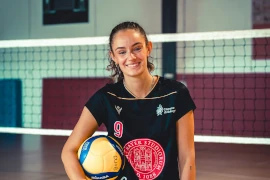 |
 |
|
EUSA Newsletter 10-2024, ISSN 1855-4571
|
The staff of the European University Sports Association, joined by the group of volunteers, experienced an active team-building trip between the 19-20 of September, marking as well the celebration of the International Day of University Sports (IDUS) and the celebration of the European Week of Sport (EWOS). The European University Sports Association (EUSA) office employees and volunteers participated in a team-building cycling activity in the area of Slovenj Gradec, a cycling scenery path through the valley of the Mislinja River. The primary goal of this two-day team building was to get to know each other better, enhance social relations, and motivation, as well as to emphasise the importance of being physically active, enjoying and preserving nature, and creating bonding experiences through doing sports and recreation. EUSA office team is composed of Secretary General Mr Matjaz Pecovnik, Sports Manager Mr Miha Zvan, Projects and Policy Manager Mr Andrej Pisl, Education and Development Manager Ms Sara Rozman, Head of Media and Communications Mr Salvatore Sisca, Communications Officer Ms Hristina Hristova, Sports Officer Ms Eszter Gulyas, Sports Administrator Ms Aleksandra Andreeva, Head of Administration Valentina Vucenovic and Finance Administrator Ms Katja Dolinšek. This year the team has grown with one new but old member, Mr Liam Smith in the function of Event Manager. The team was also joined by Ms Natasa Jankovic – EUG Liaison and the 4 ESC volunteers Ms Marta Studzinska, Ms Milia Molinie, Mr Jan Hussu and Mr Markus Schneider. The activities on the first day upon arrival, included team building activities, helping the team to get to know each other better, practice teamwork through interesting games, as well as to resolve interesting game challenges as a team. The teambuilding cycling activity followed after lunch in the second part of the day. This was an excellent opportunity to get to know each other while doing sports activities outside in the amazing natural scenery of the area. The scheduled route was along the beautiful cycling route from the city of Slovenj Gradec through the valley of Mislinja River, covering a route of 25km. With this activity, the EUSA office members, joined the celebrations of the 9th edition of the International Day of University Sport #LetsIDUS campaign, celebrated this fall across the globe, and especially honoured today, on September 20. The celebration of this day helps create links between universities and their local communities, as well as sports organisations through sports, physical activity and healthy living playing the leading role. The second day of the EUSA team building was devoted to the Evaluation of the European Universities Games 2024 in Debrecen and Miskolc, which concluded on the 24th of July. The team did the evaluation by departments, focusing on the results and challenges, discussing potential best practices as well as potential improvements in the future. The group of volunteers were given certain creative and reflective tasks, focusing on the start of their journey with EUSA office, their future months ahead, as well as their expectations and goals from this experience. The main goals of the two-day team-building trip were achieved by strengthening interpersonal relationships, fostering more teamwork inside the organization, and assembling everyone for future working activities ahead. EUSA will continue the celebrations of #LetsIDUS and #BeActive campaign at upcoming events in October, such as: the EUSA Convention 2024 and EUSA–FISU Seminar, planned to happen between the 10th and 13th of October in Salerno, Italy. More information...
SHARE 2.0 COP event: Funding
04 September 2024
|
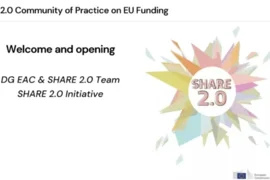
|
|
After the launch of the SHARE 2.0 initiative by the European Commission earlier in the year, the last of the thematic Community of Practice (CoP) online events was held on September 4 as a capacity building event on the topic of EU funding opportunities, focusing on sustainable sport infrastructure.
|
EUSA Office welcomes back new staff member
05 September 2024
|
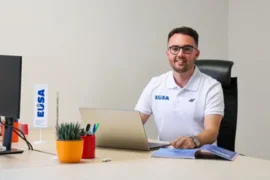
|
|
The European University Sports Association (EUSA) and its Institute are proud to announce that Mr Liam Smith is returning to EUSA Office in Ljubljana, Slovenia as Events Manager.
|
2024 annual SHARE 2.0 Conference held in Brussels
12 September 2024
|
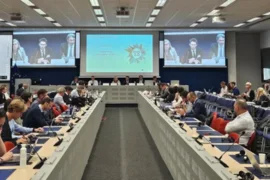
|
|
After a series of online events, members of the SHARE 2.0 initiative and invited guests attended and actively participated at the 2024 annual conference, held in Brussels on September 11.
|
CUS Bergamo wins 49th "San Giacomo dell'Orio" international tournament in Venice
16 September 2024
|
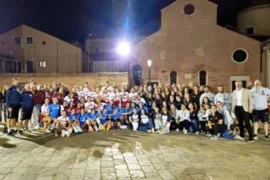
|
|
The “San Giacomo dell’Orio” international university women's volleyball tournament in Venice, Italy took place from September 12-14, 2024.
|
EUSA Audit meeting held in Bucharest
16 September 2024
|
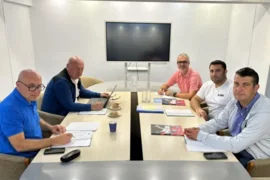
|
|
EUSA Auditors Mr Liviu Matac and Mr Hovhannes Gabrielyan met with EUSA Treasurer Mr Francis Cirianni and Secretary General Mr Matjaz Pecovnik in Bucharest, Romania for the annual audit of the EUSA accounts.
|
EUSA welcomes three new ESC volunteers
17 September 2024
|
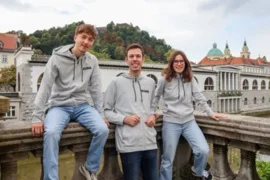
|
|
European University Sports Association (EUSA) with its Institute welcomed three international European Solidarity Corps (ESC) volunteers into the office, joining the team in Ljubljana for the period of 1 year.
|
European Week of Sport 2024 opened
24 September 2024
|
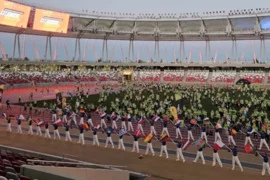
|
|
The official opening of the European Week of Sport was carried out on in Budapest, in cooperation of the Hungarian Presidency of the Council of the European Union and the European Commission.
|
EUSA awarded at University of Granada Sports Gala
30 September 2024
|
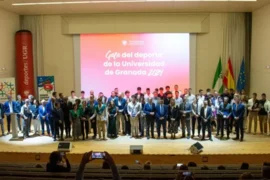
|
|
On the occasion of the University of Granada Sports Gala 2024, that took place on September 27th in Granada, Spain, the European University Sports Association (EUSA) received an award as a recognition for its 25 years leading university sport in Europe.
|
#MyEUSA 2024 photo competition is opened
30 September 2024
|
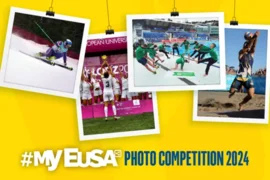
|
|
After the conclusion of this year's European Universities Games in Debrecen - Miskolc in Hungary, the European University Sports Association (EUSA) collected the entries for #MyEUSA 2024 photo competition.
|
Reflection of EUSA internship and volunteering journeys
30 September 2024
|
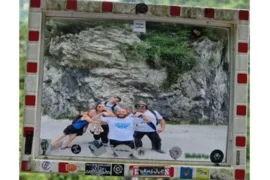
|
|
We are sharing the reflection of Giacomo and Simone, two OPES volunteers that experienced a 10 month journey at the EUSA Office in Ljubljana and Alessandro, an EUSA Erasmus+ Traineeship intern, that joined us for a shorter period of two months.
|
|
 |
| FISU Section |
FISU FVLA 2024
17 September 2024
|

|
|
From the 13th to the 14th of September, motivated and interested young individuals from all around the globe attended the FVLA (FISU Volunteer Leader Academy) to learn what opportunities await them and also to hear about past participants experiences.
|
|
 |
| EUSA Insider |
|
 |
| Important Dates Coming Up |
|
 |
| What's up! - Student Column |
Sports and safe places for LGBTQ+ athletes: Paris 2024 Olympics and Paralympics
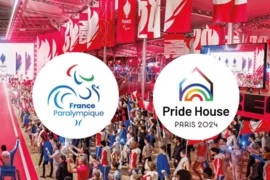 In this month’s What’s up student column, our EUSA ESC volunteer, Ms Milia Molinie elaborates on the topic of "Sports and safe places for LGBTQ+ athletes", presenting her own point of view and analysis of Paris 2024 Olympics and Paralympics. In this month’s What’s up student column, our EUSA ESC volunteer, Ms Milia Molinie elaborates on the topic of "Sports and safe places for LGBTQ+ athletes", presenting her own point of view and analysis of Paris 2024 Olympics and Paralympics.
At least 199 out LGBTQ+ athletes took part in the Paris 2024 Summer Olympic and Paralympic Games, according to the LGBTQ sports website OutSports. This number has increased from the past Tokyo Olympics held in 2021, where there were at least 186 out competitors. This is a record-breaking number for public LGBTQ representation through sports, as it is happening through an international event.
This data came along with a record-breaking television audience, said the IOC, during the summer, especially during both Paris 2024 Opening ceremonies. Indeed, the opening ceremonies held on July 26th and August 28th gathered over 35 millions of viewers on public television.
Thomas Jolly, the Artistic director who orchestrated both ceremonies, adopted a clear alignment with the Paris 2024 Games slogan “Games Wide Open”, not only because of the public setting of the events, but also through the messages shared by the artists. In fact, even though the opening ceremonies, particularly the first one, provoked mixed reactions and triggered controversy, both of them were a clear statement for the Olympics and Paralympics to be a safe place for LGBTQ+ athletes, along with the settlement of a Pride House during the summer, which the international press approved.
First of all, the Opening ceremonies played a key role in building a safe place for LGBTQ+ athletes through the “Wide Open” format across the city center, and the place de la Concorde.
In fact, the previously mentioned controversy was a clear reaction to the militant cultural performances featured by openly LGBTQ+ artists who proudly call themselves Queer. This very reaction happened because of the visibility given to the gender and sexual minorities who took over the main stage all across the city, instead of adopting avoidance strategies in an urban context. Then, the whole city was depicted as a safe place to celebrate and party, regardless of sexual orientation or gender identity. Indeed, with drag queens, openly queer artists and numerous references to LGBTQ+ culture, Thomas Jolly helped “queering the city”, as Kath Brown conceived, by redrawing, remapping historical places and monuments. The river Seine, for instance, where statues were erected in tribute to the fight for social rights, became a “female force of resistance” according to several media. Alongside, visibility was given to underground cultures such as the ballroom scene during the runway. Ballroom culture was born as a symbol of resistance created by African-American and Latino LGBTQ+ subculture. By giving space to this alternative art, Thomas Jolly and Tony Estanguet, Paris 2024 chairman, wanted to prove that there was “room for everyone in Paris”, by stepping outside the box to make everyone feel represented in it, through an intersectional approach.
This need for representation, through sports especially, represents a major challenge and a crucial need to make sports an inclusive environment. Indeed, the middle-distance runner Niki Hiltz from team USA who came out as nonbinary affirmed through an interview given to ABC News: “It is hard to be someone that you can not see.” This message was well received from the organisers of both opening ceremonies, as many LGBTQ+ artists were the main characters of the stages during these two evenings. We saw for instance drag queens such as Piche and Nicky Doll proudly walking the runway by questioning gender-conforming through their art. Then, Raya Martigny, a French model and transgender woman, was wearing the French flag on her jumpsuit, as a symbol of freedom and equality. Finally, we could dance to the DJ's beats of Barbara Butch, who is a lesbian activist through music and inclusive parties. A main focus was put on visibility also to different body types, to fight against discrimination based on physical appearance and gender identity, in particular in the light of questionings on representations of body norms in sports.
The Paralympic opening ceremony was definitely aligned with this commitment, through the live performance of Lucky Love, a disabled and queer French singer who often questions masculinity in his songs. Finally, we could see Rahim Redcar, former singer of the project Christine and the Queen, who recently came out as transgender, performing a song from the French singer Edith Piaf on the Place de la Concorde, surrounded by dancers with and without disabilities, as a symbol of unity.
Finally, representation was settled as a main objective, to make not only athletes, but also each viewer across the globe, feel they belong to such an important event, by normalising alternative representations, out in the open.
Furthermore, during the Paris2024 Olympics and Paralympics, we were able to attend clear manifestations of open mindedness towards LGBTQ+ during the sports events. This can be read as a consequence of structural progress within sports federation and IOC guidelines. In fact, the number 4 Fundamental Principle of the Olympic Charter considers the practice of sport as a “Human right… without discrimination of any kind”, and the Paris 2024 Organizing Committee set a priority to organise an inclusive and responsible event.
These commitments together with the impact of the Opening Ceremonies led to many joyful celebrations from LGBTQ+ athletes together with their family. As Billie Jean King, legendary tennis star and LGBTQ+ activist said, “sports are a microcosm of our society”, and we were able to see some LGBT celebrating moments on live TV. For instance, team USA rugby player Alev Kelter proposed to her girlfriend after she led her team to the bronze medal. Then, Australian sports climber Campbell Harrison kissed his partner after competing, and Alice Bellandi judoka went hug her family and kissed her girlfriend after winning a gold medal. Then, during the Paralympics, we could see the French paralympic cyclist Marie Patouillet celebrating her gold medal by kissing her wife before standing for the French national anthem.
Along with these loving demonstrations and celebrations, we noticed some LGBTQ+ symbols, such as Tom Daley’s (UK swimmer) rainbow towel. All these elements contribute to building a safer place for athletes seeking representation. In fact, R.K. Russel, former NFL player who came out as bisexual in 2019 said that his coming out “freed (him) from the doubt that (he) did not belong in the world of sports as a bisexual man or that (he) did not belong in the hypermasculine sport of football”. This testimony highlights the fact that for generations, LGBTQ+ people have felt marginalised in sports, because they did not belong to the heteronormative representations of athletes broadcasted through the media and the collective imagination.
Finally, alongside these celebration moments both during the opening ceremonies and the games, just like Billie Jean King affirmed that as sports reflect society, we sadly witnessed discrimination and harassment behaviours linked to the topic of LGBTQ+ representation. In fact, in the same way as some scenes from the ceremonies did lead to controversies, there are still major achievements to make on the field. The harassment that the Algerian boxer Imane Khelif suffered from relates to a “lack of female representation in coaching and leadership, and a lack of research into the prevalence of harassment and sexual abuse of women in boxing”, according to former boxer Anne Tjonndal. These gaps led to widespread misinformation and unfounded allegations that targeted both women and gender minorities. This analysis is even more relevant given that the vast majority of athletes on the list of queer Olympians (approximately 170), are women.
To conclude, Paris 2024 Opening Ceremonies stood as cultural performances on diversity and inclusion by presenting a multifaceted, multiethnic France reaching out to the rest of the world. Just like the artists did, by stepping onto the world stage as their true selves, many athletes are challenging stereotypes and inspiring young people who feel underseen or gaslighted. There is a major need for representation of LGBTQ+ identities, especially during sports events, as it is an occasion to gather and build bridges between cultures and nations.
The results through the OUTSPORTS project, the first European survey, led by the German Sport University Cologne, conducted in 2019 on sexual orientation, gender identity and sports, show that 20% of the participants do not practise their sport for fear of being discriminated against, excluded, or harassed. Alongside public representation, there is also a need for structural changes through sport organisations. There is a need to devote resources for educating sports stakeholders and incentivizing young athletes to continue practising sports in what we could proudly and finally call “safe places”. Nowadays, more and more NGOs are advocating for the use of inclusive practices into sport federations, by signing charters and sharing good practices and training. These efforts are needed to make an effective transition to turn representation into concrete action.
Today, weeks after the Paris Olympics, we know that a third of all out LGBTQ+ out athletes at the Paris Olympics went home with at least one medal. This represents a further step towards ensuring sports as an environment of authenticity and freedom for all orientations and identities out in the world.
The author of the text is Milia Molinie from France, graduate with a Master degree in international cooperation and development from both universities of Bordeaux, France and Turin, Italy, who is currently serving as a European Solidarity Corps volunteer at the EUSA Office in Ljubljana.
Are you a student with an opinion? We are looking for new contributors for our student column every month. Feel free to contact stc@eusa.eu to offer a piece or propose a topic.
read more >>
Your Data and Privacy:
EUSA GDPR: General Data Protection Regulation
Published by:
European University Sports Association (EUSA)
Office: Tomšičeva ulica 4, SI-1000 Ljubljana
Realisation/Main editor: Andrej Pišl
tel: +386 1 256 0056, web: www.eusa.eu
social: Facebook | Twitter | Instagram | Threads | YouTube | LinkedIn | #eusaunisport #myeusa
|
 European University Sports Association European University Sports Association 
|
|

















